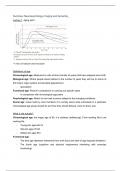Resume
Samenvatting - Neuropsychology of aging and dementia (PSB3E-CN06)
- Cours
- Établissement
De samenvatting bestaat uit alle colleges en de readings per week die gelezen moesten worden. De readings en de colleges samen vormen de literatuur voor het tentamen, wat dus allemaal is samengevat in deze samenvatting. De samenvatting geeft een uitleg over de belangrijkste concepten, bevat voo...
[Montrer plus]



